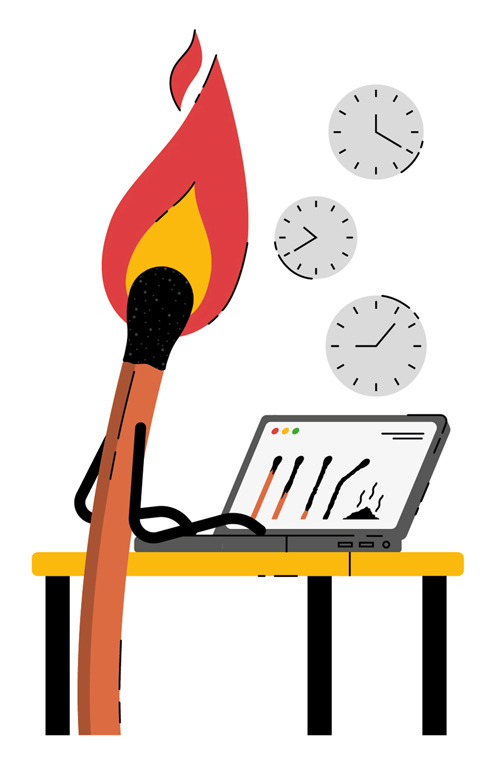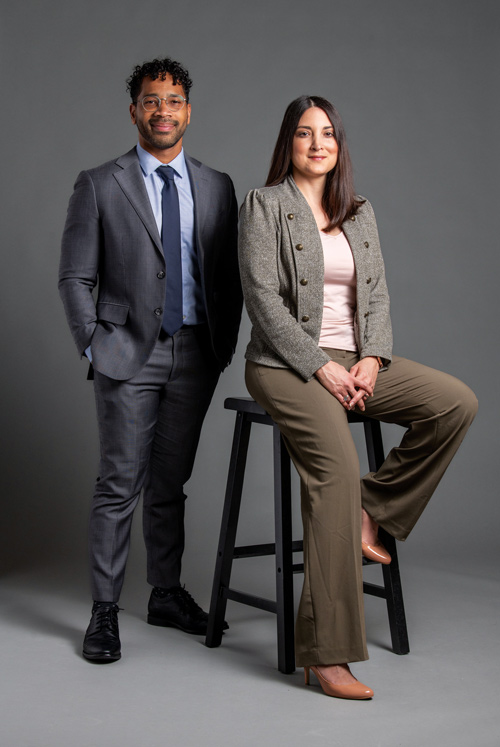Research - THE MATCHES MEASURE
Researchers develop a new visual scale that offers a simple measure to help identify job burnout.
“Job burnout” is a term that’s far too familiar to many people. A 2020 Gallup poll showed that 76 percent of employed Americans surveyed have experienced burnout.
 Perhaps due to the condition’s prevalence, the World Health Organization recently reclassified burnout in its International Classification of Diseases as an occupational syndrome resulting from “chronic workplace stress that has not been successfully managed.”
Perhaps due to the condition’s prevalence, the World Health Organization recently reclassified burnout in its International Classification of Diseases as an occupational syndrome resulting from “chronic workplace stress that has not been successfully managed.”
Employees and employers, across industries, are increasingly experiencing the harmful effects of chronic stress at work. Job burnout can lead to reduced productivity, increased absences and leaves, job turnover and even hospitalization.
Existing methods of identifying job burnout are lengthy and sometimes proprietary, but new research from the University of Notre Dame offers a faster and easier way.
“Matches Measure: A Visual Scale of Job Burnout” is forthcoming in the Journal of Applied Psychology from lead author Cindy Muir (Zapata), professor of Management & Organization at Notre Dame’s Mendoza College of Business, along with Charles Calderwood from Virginia Tech and Dorian Boncoeur, assistant professor of Management & Organization at Mendoza.
“Because the Matches Measure is a visual measure, it makes assessing burnout as quick and easy as it gets — across countries even,” Muir (Zapata) said. “It eliminates one of the reasons organizations fail to assess their employees regularly: time. By using the Matches Measure, managers and organizations can better understand how prevalent job burnout is amongst their employees and how it fluctuates over time.”
Similar to the smiley face pain scale used in doctors’ offices and hospitals (Wong-Baker FACES), the Matches Measure describes burnout (“job burnout refers to feeling physically, mentally and emotionally exhausted”) and instructs employees to “select the match that best represents how burned out you currently feel.”
Across multiple pre-registered studies surveying more than 1,200 participants in various industries, this research demonstrates that the visual scale is comparable to existing burnout measures, including the Maslach Burnout Inventory. The Matches Measure similarly relates to the known predictors and consequences of job burnout, yet uses a more efficient, intuitive scale.
The study concludes, “Given the advantages of a short, visual measure — reduced participant fatigue, the reduced need for translating feelings into words and increased participant understanding, there is ample evidence to motivate future scholars to rely on the Matches Measure rather than shortening existing burnout scales.”
 Developed in 2020, the Matches Measure is the only validated visual measure of job burnout. The scale is currently available for distribution via no cost for research purposes while other users can acquire a license for non-academic use. Muir also offers one on one consulting for those experiencing job burnout. The scale, services and other related resources can be found at at muirmatches.com.
Developed in 2020, the Matches Measure is the only validated visual measure of job burnout. The scale is currently available for distribution via no cost for research purposes while other users can acquire a license for non-academic use. Muir also offers one on one consulting for those experiencing job burnout. The scale, services and other related resources can be found at at muirmatches.com.
Muir received her Ph.D. in Management from the University of Florida. She is a highly published, highly cited scholar and most recently served as an associate editor for the Academy of Management Journal.
Her varied research interests include studying individual differences (including diversity issues), organizational justice and trust, leader humility and burnout. Muir tends to focus on the context of supervisor-employee relationships with the goal of better understanding the leader-direct report relationship divide by studying factors that exacerbate or minimize this disconnect.
Muir brings her research into the classroom as she teaches courses at Mendoza such as diversity management, decision making, leadership, management (organizational behavior), change management, negotiation, talent management and research methods.
Co-author Dorian Boncoeur’s research examines human sustainability in the workplace and how employees can contribute to their organizations without subverting their own well-being. His research has appeared in peer-reviewed journals such as Personnel Psychology, Journal of Business Ethics and Journal of Business Research.
To carry out this research, Boncoeur runs experience-sampling field studies, analyzes archival data and conducts interviews as well as online and laboratory experiments. At Mendoza, he teaches management at the undergraduate level.
Boncoeur received his Ph.D. in International Management Studies (Organizational Behavior) from the University of Texas where he was the recipient of the Expiwell Dissertation Award.
Illustration by Errata Carmona. Photo by Barbara Johnston.
CINDY MUIR (ZAPATA) joined the Mendoza College of Business in 2019 and is a professor of Management & Organization.
DORIAN BONCOEUR is an assistant professor at the Mendoza College of Business and studies human sustainability in the workplace.
Published
“Matches Measure: A Visual Scale of Job Burnout
Journal of Applied Psychology
Cindy Muir (Zapata), Dorian Boncoeur (University of Notre Dame), and Charles Calderwood (Virginia Tech)

Comments